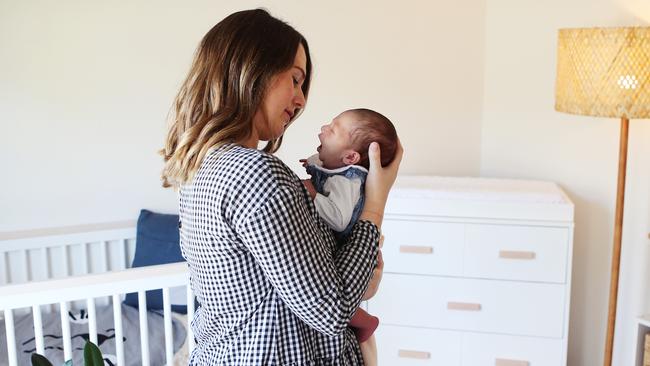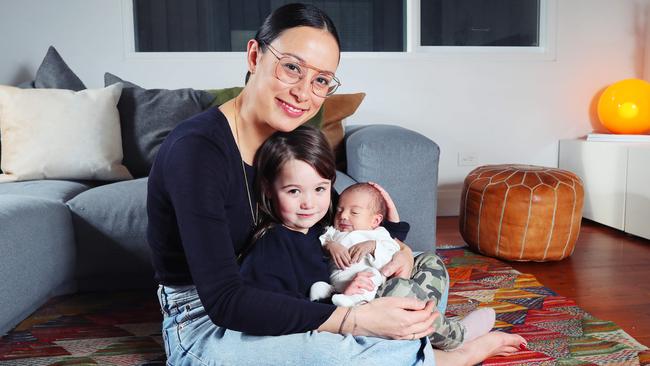Parents and their new borns finding the positive side to lockdown restrictions
Face-to-face appointments have been swapped for Telehealth and video calls are the new family visits for parents and their newborns, but these mums say the changes have a positive side.

Lifestyle
Don't miss out on the headlines from Lifestyle. Followed categories will be added to My News.
Plans were made many months ago for the arrival of Freya Nicholas’ first baby. There would be cherished visits from grandparents, photos with every new visitor, face-to-face appointments with lactation consultants and midwives.
But then COVID-19 arrived and excited plans turned to anxious concerns.
“I was worried about having appointments moved to Telehealth because I couldn’t understand how I could be supported as well over the phone as I would be in person and I was worried my partner might get sick and couldn’t be with me for the birth,” Nicholas says.
“I was really nervous about being isolated for the post-natal period. Then, I was planning a home birth, which we were not able to do because my waters broke early before the contractions started.
“Nothing was quite as we planned.”

Nicholas, 27, a teacher, and her partner, Alap Varma, 26, managed to turn a stressful, unexpected situation into one of the most cherished, intimate moments of their lives to share with their four-week-old daughter, Maya. The Sunshine North couple may have been prepared for calamity but COVID-19 has turned into a blessing for them in many ways.
“We would have loved to have had photos of Maya and her grandparents in the early days but we have to think about the bigger picture, which is her safety, their safety and the wider community,” she says.
“They’ve been able to see her from a distance through windows and we know the time for cuddles will come.
“For us through this time, we’ve been able to learn so much and now I feel able to determine whether Maya’s hungry or whether she needs her nappy changed.
“She’s a very calm, settled baby and I wonder whether that’s because she hasn’t had to be passed around to visitors and adjust to their different smells, voices and being away from us, the two most important people in her life. She’s had time and space to really bond with us.”
It’s been a common experience for many new parents during isolation. While there have been plenty of challenges and disappointments, primarily because they haven’t been able to share their new baby with their own parents and friends, they have been able to enjoy being in a cocoon with their newborn.
In many ways, it’s an ideal situation according to midwives, who say the first 30-40 days of a baby’s life are supposed to be reserved only for their parents to build the baby’s immunity, limit the stress of multiple meetings and outings, and bond.

About Birth educator and doula Jules Brook says in Australian culture, women are keen to get their bodies back in shape straight after having a baby and to get back out into their pre-baby world as soon as possible. It can be a time of anxiety and rush — and it’s all happening in the fog of sleep deprivation.
“Not enough women give themselves time to recover from the nine months of growing a baby, delivering a baby and then caring for a baby once it’s born, which often means sleep deprivation,” Brook says.
“In other cultures, this post-natal time of 21, 30 or 40 days is talked about as a time where women are entering into motherhood. They are honoured, looked after and given time to rest and get to know their baby. The mother has to establish a good breastfeeding pattern and not be interrupted by visitors.
“This is a really critical time for mother and baby to connect and for mother and baby to get to know each other.”
She is keenly aware of the struggle facing grandparents during this time but says acts of care such as dropping food off at the new parents’ home can be a great help.
“Grandparents can still be a great help, they just can’t physically be there,” she says.
The “bubble” experience has been a great gift for Nicholas. It’s given her time to recover and has meant her partner will be on hand for longer while working from home.
“It’s been such a content, happy time.”
It's been a similar experience for Sarah Morrison, 37, whose second daughter, Agnes, was born just two weeks ago. The isolation experience has enabled the whole family including Bonnie, 4, and father Russell, 43, to get to know each other in their Seddon home.
“It's made a huge difference to Bonnie to have that one-on-one time with her new sister,” Morrison says. “Normally Bonnie would be at kindergarten but she’s been here at home and she’s been bonding really well with Agnes. Hopefully, we can all learn from this and enjoy the slowdown time once isolation ends.”

When Bonnie was born, Morrison took advantage of the one-on-one consultations with midwives and the local council’s maternal child health nurse but with Agnes, those meetings are being held by phone.
“Russell and I are from Western Australia and both our mothers had planned to be here at this time, so it makes a big difference to the experience we had with Bonnie and it is quite lonely with a new baby in these circumstances.
“But I’m also not really wanting to go out. Silly little things make me sad, such as the friends who wanted to bring flowers and they had to leave them by the gate. That made me sad. You’re trying to make human connections but we can’t give anyone a hug.
“On the flip side though, it’s been nice to have a forced quiet time. With Bonnie, I was really social and didn’t give myself enough rest time because I wanted to just do normal things. This time around, it has been nice to go with a different flow and be more chilled.”
Royal Women’s Hospital midwife Sarah Knight says many of her patients are finding benefit in the isolation experience and it’s particularly good for their babies.
“When babies have their baby bubble interrupted with visitors they tend to be awake more,” Knight says.
“We encourage mums to rest when their baby rests. If they have a stream of visitors, they’re unable to do that. If you have that bubble situation, you’re forcing women to rest and there’s no pressure to entertain guests. They can sleep when their baby sleeps and don’t have to worry about having a messy house either.”
While some women are missing the extra support from family and friends, Knight says she is also noticing more women adapt well to breastfeeding during isolation. Without additional external stress, mothers can focus more on their baby to learn from the baby about its needs.
“This newborn time is as important as pre-pregnancy and I really hope mothers will take stock while also acknowledging that all mothers are different and this time may not be beneficial for all,” she says.
MORE NEWS:
MAJOR SHOPPING PRECINCTS BUSIER AS MYER OPEN TALKS GROW
BOYS’ SCHOOL HEAD CALLS OUT LACK OF WOMEN IN LEADERSHIP
